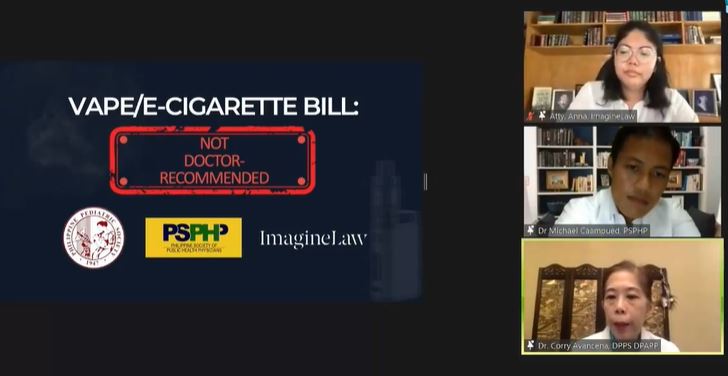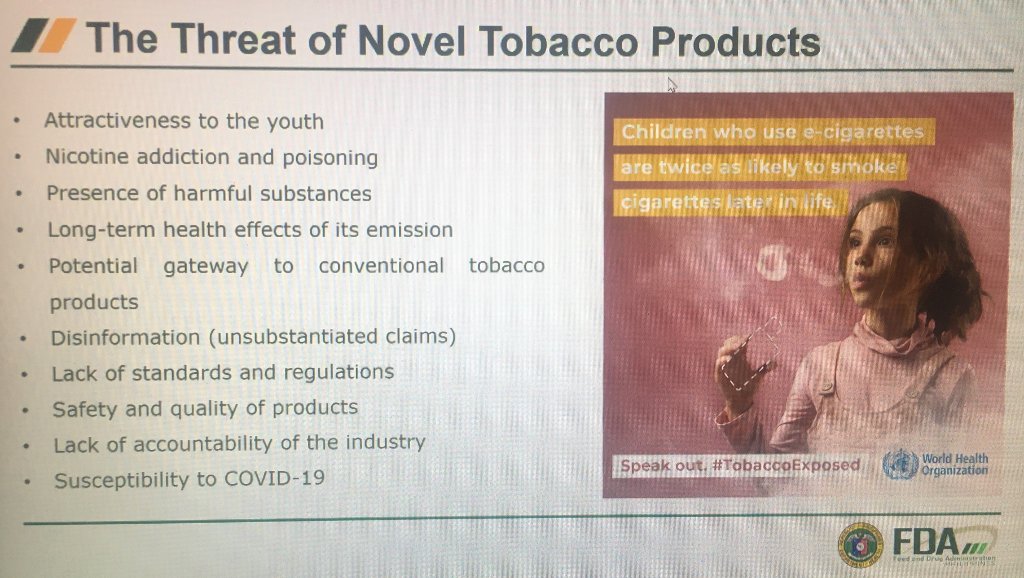The Department of Health (DOH), Department of Education (DepEd) and Food and Drug Administration (FDA) joined medical practitioners and youth leaders on Wednesday in asking Congress to reject the bill that seeks to lower the age of persons who can buy, use or sell vapes and electronic cigarettes
Beverly Ho, director of the DOH Health Promotion Bureau; Maria Corazon Dumlao, chief of DepEd’s School Health Division; and, Enrique Domingo, director general of FDA, were one with medical practitioners and youth leaders in saying that Senate Bill (SB) No. 2239, or the Vaporized Nicotine Products Regulation Act, and its counterpart House Bill No. 9007, favor the tobacco industry at the expense of people’s health, particularly the youth.
Guesting in a Sept. 15 forum “Pa-Cool Pero Harmful” organized by ImagineLaw, a nonprofit public interest law organization, the officials argued that some provisions of the bills are not aligned with existing laws and inconsistent with the government policy to protect and promote health especially in the midst of the pandemic.
Ho warned that users of vape and heated tobacco products are more susceptible to the coronavirus disease 2019 (COVID-19), apart from being exposed to toxic chemicals that can cause cancer and increased risks of other serious diseases such as heart and respiratory ailments as well as explosion injuries.
“During this time of the pandemic, it is crucial to understand that vape may cause inflammation and enhance the adherence of infectious organisms. This makes the vapers, their loved ones and the community exposed to emissions more susceptible to COVID-19,” Ho said.
To emphasize the health department’s opposition to the bill that had been approved by the House and currently debated in the Senate, Ho cited an alarming increase in the use of e-cigarettes among the Filipino youth, from 11.7% in 2015 to 24.6% in 2019.
While SB 2239 provides for government regulation of the importation, manufacture, sale, packaging, distribution, use and consumption of vape and heated tobacco products, it lowers from 21 to 18 the age of persons who can buy, sell or use these products. It also classifies vapes and e-cigarettes as consumer products that should be regulated by the Department of Trade and Industry.
DepEd’s Dumlao said if existing laws on vape and e-cigarettes would be amended, it should raise the age of persons who can access these products from 21 instead of lowering it to 18.
The age of accessibility to the products should be raised, she said, because the brain is “not fully developed until one is in (his) mid-20s.”
“Education can only do so much. We can teach them about the harm of vape use … but beyond these lessons, what we need are policies and structures,” Dumlao said.
The DepEd official cited the top three reasons for the increasing number of young users of vape and e-cigarettes: online accessibility of the products, varied flavors and the misconception that these are safer than the conventional tobacco cigarettes.
In view of this, Dumlao said the government should ban online selling of these products, disallow flavored liquids for vapes and e-cigarettes, and its regulation should be retained under the FDA.
FDA’s Domingo echoed the positions of the DoH and DepEd, saying that the pending bill is backsliding from existing health policies even as he noted efforts of the tobacco industry to employ marketing strategies such as sponsorship of events and introduction of flavors that make the products appealing to the younger people.
He said lawmakers supporting the bill should “reconsider their positions” and reject the bill. Vapes and e-cigarettes, he asserted, must be categorized as health products under the regulatory purview of the FDA.
“This is a product that you take into your body, has chemicals, has drugs – nicotine – and has a physiological effect … Pag hindi ito food and drug, napakahirap na isipin kung ano siya. Magiging trade product siya … [it] may undermine the health risks associated with such. Therefore, it is crucial to categorize these aforementioned products as health products because they do have an effect on the health of the person using them,” Domingo pointed out.
(If this is not food and drug, it’s difficult to determine what it is. It will become a trade product…)
The dangers of vaping, secondhand and thirdhand vaping
In the same forum, physician Rizalina Racquel Gonzalez of the Philippine Pediatric Society said that vaping, which forms an aerosol cloud containing tiny solid particles that are harmful to health, is not safer than traditional tobacco smoking.
“Our airways from the nose down to the air sacs are designed only to get clean air. Inhaling this aerosol harms the immune system. Only clean air is safe,” she said, adding that the bill may increase the occurrence of secondhand and thirdhand vaping.
“[The aerosol cloud] is furthering those chemicals. Those bystanders, they inhale the same amount of carcinogens and chemicals that are produced from our heated aerosols…Thirdhand aerosol is actually true. No matter how you scrub it with Clorox, it stays there for months” on hygroscopic surfaces, she said.
Fragrant yet harmful
According to another medical practitioner, Dex Galban of Alaga Health and the Commission on Population and Development (POPCOM), people may be more wary of traditional tobacco products because of the smell, but may not have the same reaction towards vaping because of its pleasing smell.
Galban said he was worried that this is the tobacco industry’s tactic to lure the youth with attractive vaping flavors. He added that these flavors should not even be sold in the market.
“Not everything that smells good is good… The country will carry the weight for those who will eventually have popcorn lung, lung cancer and other diseases associated with vaping,” he said.
Some youth group leaders aired similar warnings. Nicole Picart of the Association of Philippine Medical Colleges – Student Network said that the flavors may bring “more danger,” not just by masking the taste of tobacco but also by helping the youth start vaping with friendlier flavors.
Galban added that “this industry evolves into something that will make their industry relevant in this time as most of us are in the digital space… It is important that we should be vigilant.”
Vaping “won’t help smokers quit their addictions, it will not protect the smokers. It will just prolong and make diseases in the long run,” he said.
‘Effective policies’
Physician Glynna Ong-Cabrera, head of Lung Center of the Philippines on Smoking Cessation, echoed Ho’s warning that smokers may be more susceptible to COVID-19.
“Normally, for a person to vape, you have to remove your face shield and face mask… dumadami ‘yung entry points (there are more entry points),” said Ong-Cabrera, adding that vaping may also increase the risk of spreading the virus when puffing out the aerosol.
Sophia San Luis, executive director of ImagineLaw, called on lawmakers to promote effective policies relevant to the health crisis.
“In the middle of the pandemic, policymakers are weakening the policy that should be for health. This is a betrayal that we should be protected,” she said.
San Luis urged stakeholders and advocates to oppose the bill and have their voices heard by sending letters of concern to the legislators.
Galban said he was hoping legislators will listen more to the medical community on the issue of vaping.
“[The medical community] has been consulted so many times. With the pandemic, they listen to the medical community, but what is it with this topic that makes it seem like they are turning a blind eye or a deaf ear to the medical community?” he asked.
Editor’s note: VERA Files is part of Project Seeing Through the Smoke, which has support from the International Union Against Tuberculosis and Lung Disease, Inc (The Union) and Bloomberg Philanthropies.




